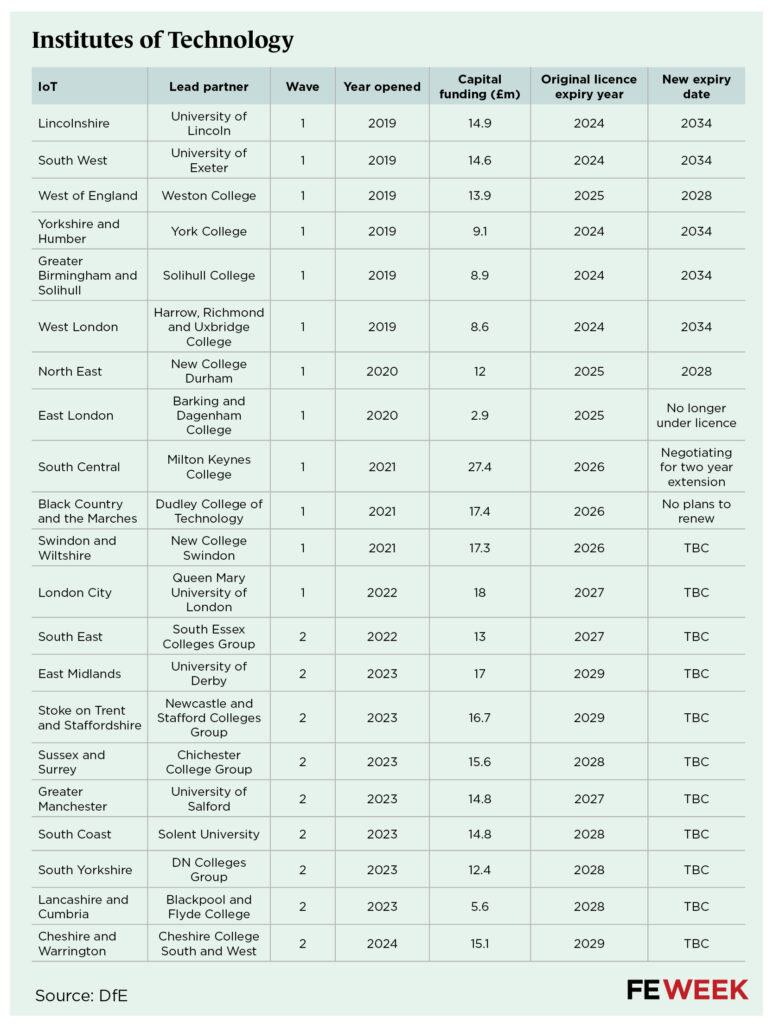Two Institutes of Technology have ditched the flagship scheme amid fears Labour is lukewarm on the project, FE Week can reveal.
East London Institute of Technology, which launched in 2019 backed by £3.5 million of public funding, quietly exited this summer, citing “uncertainty” over government policy.
Black Country and Marches IoT, formed in 2021 with £17 million, will follow next year to gain “more freedoms” over its curriculum once its licence expires.
Their departures mark the first official exits since the Conservative government launched the policy six years ago with around £300 million in capital investment.
FE Week understands the Labour government planned to let IoT licenses lapse when their respective five-year terms came up for renewal, but Department for Education officials reversed this decision in March after the national network “rallied” in support of extensions.
IoT successes
Institutes of Technology, which are partnerships between colleges, universities and employers, aimed to drive a “step change” in level 4 and 5 skills when they launched in 2019.
Twenty-one institutes were established, involving 77 colleges, 35 universities and 99 employers, supported by £290 million in capital grants for new classrooms and high-end equipment. IoTs also tapped into a £54 million grant pot for developing higher technical qualifications (HTQs).
A previous FE Week investigation found the institutes were successful in recruiting students. But enthusiasm for the branded model appeared to wane when Labour came into power with a manifesto commitment to roll out a range of Technical Excellence Colleges (TECs).
Recent announcements, such as the prime minister’s ambition for two-thirds of young people to attain higher-level skills by age 25, suggest the government shares the same goals as IoTs.
But following an internal review late last year, officials are understood to have told the network they would no longer champion a small selection of “providers under a licence”.
Instead, the DfE suggested it would foster collaboration between colleges, universities and employers as the “default” way of working.
Then in March, after lobbying by IoTs, the government said it had “reconsidered” its approach and began issuing three-year extensions. The renewals were shorter than the 10-year extensions granted to five ‘wave one’ IoTs before the 2024 general election.
Last year, the government also cancelled a £23 million grant programme for 2025-26 to help providers increase uptake of HTQs at levels 4 and 5.
New directions
In return for initial capital investment and use of the IoT brand, partners committed to match funding of at least 35 per cent and hitting various targets. They included achieving at least 1,500 student starts at level 4 and above by their fifth year, and a focus on enrolment of women and learners from lower socio-economic backgrounds.
East London IoT, a partnership between Barking & Dagenham College, Coventry University and employers including Transport for London, said it declined to renew its licence due to “high levels of uncertainty surrounding the future” of the policy.
The institute, opened with £2.9 million in capital and supported with £500,000 in HTQ funding, built advanced robotics and digital labs used by 5,000 students. A Barking & Dagenham College spokesperson said the facilities would leave a “lasting legacy” but would no longer operate under the IoT brand.
Black Country and Marches IoT, which has taught around 1,700 students, said its plan was to “reposition” away from its licence next year to gain “greater freedom” over who and what it teaches.
Lead partner Dudley College of Technology said leaving the IoT network would allow it to expand training for younger learners below level 4, while Ben Towe, managing director of Hadley Group, who sits on the IoT board, said the move would “open up opportunities” beyond its current specialisms in advanced manufacturing, medical engineering and modern construction.

‘Fully committed’
IoTs that choose to relicense receive no further government investment beyond their initial capital grants. But despite funding for HTQs also drying up, partners told FE Week they continued to see the benefit of being a lynchpin of regional collaboration, offering a single front door to businesses seeking high-level technical training.
Multiple institutes told FE Week they remained “fully committed” to their local partnerships, which they see as “critical” to tackling skills gaps by helping students and employers navigate “complex” technical education pathways.
A spokesperson for New College Swindon, which leads Swindon and Wiltshire IoT, said confirmation of whether it will extend beyond the current 2026 expiry date would be shared “in due course”.
IoTs in wave 2, which opened between 2022 and 2024, have licences that expire between 2027 and 2029.
A Greater Manchester IoT spokesperson said the government’s renewed focus on higher-level skills “reinforces” the importance of its work, adding: “All our employer and education partners remain positive and supportive of the GMIoT and its value to the region.”
A spokesperson for East Midlands IoT said: “Students and industries are beginning to understand the value in strong local technical provision and clear pathways through more bite-sized layers of technical learning.
“The process is complex and takes time, but employers are committed to working with us to help them grow the skilled workers they, the region and wider economy, need.”
The DfE has never published data revealing IoTs’ performance.
In response to an FE Week freedom of information request for this data, the DfE refused to share what it held on individual institutes, arguing that publication would “prejudice the conduct of public affairs” due to concerns about accuracy and delays in reporting.
IoTs meet TECs
Last month’s skills white paper mentioned IoTs twice, saying that new technical excellence colleges should “draw on” their experience and expertise.
Labour has committed to launching 29 technical excellence colleges. Ten in construction have so far been named. Competitions to find five for defence, five for digital technology, five for clean energy and four for advanced manufacturing are set to launch by the end of the year.
IoT partners, five of which are already TECs, told FE Week they were confident the two initiatives would operate “synergistically”.
These include Dudley College of Technology, part of Black Country and the Marches IoT, Wigan & Leigh College, part of Greater Manchester IoT, Derby College Group, part of East Midlands IoT, Exeter College, part of South West IoT, and City of Sunderland College, part of North East IoT.
But former Dudley College of Technology chief executive Lowell Williams, a director of Black Country and the Marches IoT until this summer, said creating TECs “adds more confusion to the skills landscape”.
He added: “Why would you need both? You could have reshaped the brand to meet the aspirations of TECs.
“They’re both still about technical excellence and working with employers – it’s all the same ingredients. Governments just like new things.”
















Your thoughts